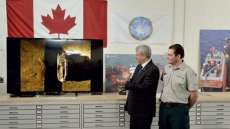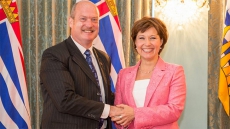OTTAWA - Canadian CF-18s will soon be heading off to war in Iraq, leaving Parliament and the public in a fog about some key elements of the military commitment — notably what efforts will be made to limit civilian casualties.
The House of Commons stands poised to approve a motion, likely on Tuesday, that would deploy six fighter-bombers, two CP-140 surveillance planes and one refuelling aircraft for coalition air strikes in Iraq for up to six months.
Tuesday's vote comes as the Pentagon warns that extremists with the Islamic State of Iraq and the Levant have "gotten better at concealment" since the U.S., Britain, France and key Arab countries began air raids.
U.S. Rear Admiral John Kirby, the assistant secretary of defence for public affairs, told reporters in Washington that extremists who rode around in the open have now dispersed and are hiding among the civilian population, but forcing allied air forces to change their own strategy.
"We've seen them change some of their tactics," Kirby said.
"Before the airstrikes happened, they were — they pretty much had free rein. They don't have that free rein anymore, because they know we're watching from the air."
The Harper government was mute during Monday's debate about what precautions would be taken to prevent bombs from going astray and killing innocent people.
Defence Minister Rob Nicholson would only say that the air force will "live up to the highest standards."
National Defence was asked what sort of legal agreements were in place to protect Canadian pilots from possible accusations of targeting civilians.
A spokeswoman for Nicholson, Johanna Quinney, would only respond with the blanket assurance that the air force is "authorized to strike ISIL in the Republic of Iraq."
The use of airstrikes — and the resulting civilian casualties — was a big factor in turning many Afghans against NATO forces in that country. The anger became so strong that the U.S. general leading the war effort was forced to place limits on how and when they could be used.
The Libya bombing campaign was conducted with relatively few civilian casualties, but those deaths were reviewed by a United Nations commission that urged the military alliance to conduct its own further investigation.
Green party Leader Elizabeth May questioned the effectiveness of airstrikes, citing published reports from the region quoting Kurdish fighters who say the airstrikes have failed to slow ISIL's advance.
"They scattered and re-form after the jets leave," said May, who asked for evidence that the bombing runs would prove effective.
She wondered whether "the planned mission will do anything other than to fall into the trap (ISIL) has set to get us involved for their propaganda and ongoing efforts to destabilize the region and encourage recruitment."
Neither Nicholson nor National Defence would say which of Canada's principal fighter bases — Bagotville, Que., or Cold Lake, Alta. — would contribute the CF-18s.
The Conservative government also refused to say where the aircraft would be based in the Middle East. Britain, on the other hand, has made no secret of the fact its Tornado GR4 fighter jets are operating out of Cyprus.
Nicholson would not provide an estimate on what the deployment could cost, despite the fact the U.S. openly acknowledged last week its campaign is already closing in on the $1-billion mark.
By way of benchmark, Canada's nearly eight-month long air assault on Libya in 2011 — with an identical-sized force — cost roughly $350 million.
Also left unanswered by the debate was the question of under what circumstances Canadian aircraft would conduct missions over Syria.
Last week, Prime Minister Stephen Harper said such raids would only be done with the consent of the Syrian government, but the NDP expressed outrage at the notion.
President Bashar al-Assad's government, which ISIL has been fighting, would stand to benefit. Conservative ministers have so far not explained how such consent for Canadian bombing would be obtained.





